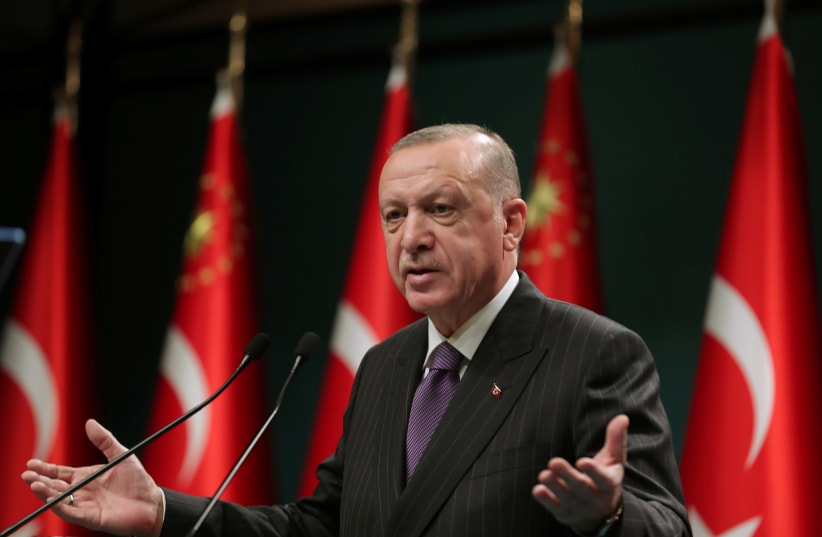Prime Minister Naftali Bennett, Foreign Minister Yair Lapid and Finance Minister Avigdor Liberman all voiced vehement opposition to occasional efforts made by Netanyahu to improve relations with Turkey, for various reasons – moral, strategic, national honor or electoral.
Politicians on the Left sought to distance themselves from Turkey citing its deteriorating democracy, and shifted from support for improved ties to equating former prime minister Benjamin Netanyahu’s misdeeds with Erdogan’s. Gradually, an attitude took hold in Israel’s corridors of power portraying Turkey as an almost hostile state with which efforts to improve ties were a waste of time.
Israeli reactions to the phone call Erdogan initiated with Herzog reflected this skepticism of Turkey’s intentions. Some argued that it was nothing but a Turkish effort to curry favor with the Biden administration, that the move illustrates Turkish weakness, which should be met with a hardline Israeli reaction, or that this was a ploy by Erdogan to mask negative attitudes toward Israel and the Jews. Very few in politics or the public looked at the half-full glass and welcomed the move as signaling a desire for dialogue and a departure from the confrontational discourse underpinning Israel-Turkey relations in recent years.
There is no need for peace or normalization agreements between Israel and Turkey, like what is necessary with countries in the Arab world. The two states have maintained uninterrupted diplomatic relations since 1949. While these relations have had their ups and downs, some even dramatic, they were never cut off. Even over the past decade, despite the deep crises in relations, economic and civilian ties were maintained (and sometimes even expanded, for example in trade) and low-key diplomatic and security contacts took place (and even led to the 2016 reconciliation agreement, which did not withstand the test of time). The move that is needed now is relatively simple, revolving around the return of ambassadors to Ankara and Tel Aviv.
To that end, there is no need for a formal agreement nor for parliamentary resolutions. In 2018, when Turkey expelled Israel’s ambassador, it did not officially downgrade relations as it had done in the past. Nor did Turkey present any concrete, public demands for the rehabilitation of relations, as it did following the 2010 Marmara incident. In return for the 2016 rapprochement with Turkey, Netanyahu issued an apology, was willing to pay over $20 million compensation, and allowed Turkey to carry out infrastructure projects in the Gaza Strip. Netanyahu came under public criticism for these concessions.
Restoring relations to ambassadorial level would not require such moves. It could simply be presented as repairing what was an essentially technical mistake, and the return of ambassadors could be carried out quickly, almost overnight. And if Israel succeeds in mobilizing Turkey’s help for negotiations with Hamas on the return of Israeli prisoners and bodies of its soldiers, which Netanyahu failed to achieve in 2016, it would yield public and political benefit for the architects of the agreement. Israel has already proven that it can improve relations with Turkey without impairing other regional relationships that it values more – with Egypt, Greece and Cyprus. It will be able to do so now, too, and has already conveyed a message to that effect to its Hellenic partners.
Improved ties with Turkey would expand Israel’s options in the Mediterranean – from Turkey to Morocco – and its ability to play a key role in the region. Israel would also benefit strategically from establishing a dialogue with Turkey on Syria, Iran and Russia – issues on which the two countries have more shared interests than one might imagine. New opportunities would also emerge for economic and civilian Israeli-Turkish cooperation. At the same time, it is important not to ignore the major divisions between Israel and Turkey on the Palestinian issue, which undermined previous attempts to improve relations. It might be possible, for example, to identify an area in which Turkey could play a role in the efforts led by Regional Cooperation Minister Esawi Frej to strengthen Israel’s economic links with the Palestinian Authority.
Herzog should continue to play an important role in deepening the positive dialogue between the sides. In 2016, too, three months prior to the signing of the reconciliation agreement, a phone call between former president Reuven Rivlin and Erdogan contributed to enhancing the climate.
But the maturing of a diplomatic rapprochement requires government involvement, especially by the Foreign Ministry. Turkish officials have identified potential for cooperation with Israel especially in the fields of tourism, technology and energy, and this can be leveraged to create dialogue between professionals on both sides and relevant ministers. The Economy Ministry is also important in this regard given the extensive trade between the countries, and so are the Health and Environmental Protection ministries since they deal with issues that are of growing importance to both countries.
Expansion and diversification of the ties between government officials could pave the way for an eventual conversation between Bennett and Erdogan, perhaps even a side-meeting at the UN General Assembly in September in New York.
On his visit to Brussels this month, Lapid spoke of optimism as a political force. On the Turkish issue, the time is ripe to make use of that force and to put an improvement of ties to a real test. After all, repairing frayed relations has become the initial trademark of the new Israeli government’s foreign policy – with Jordan, with the US Democrats, with the European Union and even with the Palestinian Authority.
Could Israel-Turkey relations move in that direction, too, despite the obvious difficulties, historical baggage and the glass ceiling of the relationship?
At the very least, this deserves an in-depth examination by diplomats, experts and especially the heads of Israel’s “government of change” – despite everything they said in the past about Turkey.
The writer is the president and founder of Mitvim - The Israel Institute for Regional Foreign Policies and a lecturer at the Hebrew University of Jerusalem.
